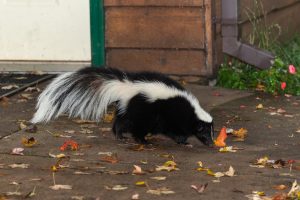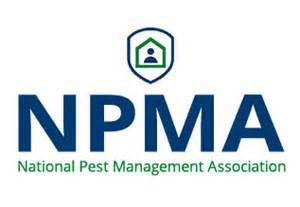Proudly serving Lake County IL, Eastern McHenry County and Northern Cook County
Skunk Removal & Control
Do you see skunks around your home or property? A strong skunk smell in or around your house and visible digging under stoops, decks or patios are all indicators that skunks are living on your property. If you experience any of these signs, contact the professionals at Animal Control Specialists for fast skunk removal. We have the experience, knowledge, and resources to remove skunks from your home safely and effectively.
 Skunk removal has become the most common issue in terms of number of calls that Animal Control Specialists, Inc handles. Skunks are the most common animal trapped by us.
Skunk removal has become the most common issue in terms of number of calls that Animal Control Specialists, Inc handles. Skunks are the most common animal trapped by us.
The primary issue caused by a skunk residing on your property is their smell. The odor they emit when they “spray” causes people to call the fire department thinking something is burning, complain of burning eyes and nausea, temporarily move out of their home and spend thousands of dollars to deodorize their home from top to bottom.
In most cases fresh air and time will result in the elimination of the smell. Most of the time when a home is overcome the smell of a skunk den site can be found somewhere along the foundation of the structure. This, however, is only true if the source of the odor has been removed.
Animal Control Specialists, Inc. has the skills required to successfully capture and remove skunks. While we can not guarantee a captured skunk won’t spray during the removal process, our odorless removal rate is close to 80%.
Warning Signs to be Aware of if You Encounter a Skunk:
According to The Humane Society:
“Skunks use their powerful defense only when they or their young are threatened and cannot escape. Even then, they give ample warning that should be heeded — stamping front feet, a raised tail, hissing, short forward charges and twisting their hind end around in your direction.”
A common problem caused by the defense mechanism of skunks is when our pets encounter one. There is a skunk odor neutralizing solution made from common household products (see below) that does work effectively. We suggest you use caution where this applied, the Hydrogen peroxide can bleach colors. The mixture results in a foaming release of oxygen and will rupture a sealed container. It is also recommended to avoid contact with eyes.
Skunks can also be carriers of disease. The Penn State College of Agricultural Sciences advises:
“Skunks can carry rabies. When a skunk becomes infected with the virus, it may not be apparent for many days. Any skunk showing abnormal behavior, such as daytime activity, may be rabid and should be treated with caution. In addition, avoid overly aggressive skunks that approach without hesitation.”
If you suspect that a diseased skunk is living near your home, call a professional skunk removal specialists immediately.
Skunk Removal & Control Measures
I set a trap for a (animal of your choice) and I caught a skunk.
We get many calls every year from homeowners that a set a trap for an animal and surprised to find a skunk captured when they check it in the morning. Some people will try to let it go or put the cage, skunk and all, into their trunk and drive it away for release. We don’t recommend this for a couple of reasons. First of all, it is illegal to set a trap without a permit. Second, it is illegal to release skunks in Illinois. This is due to the fact that they are a vector for the rabies virus. Finally, it can take a lot of time and effort to get rid of the smell of a skunk, especially from inside your car. Call a professional to handle skunk removal safely and legally.
Some of the other situations that skunks find themselves in that we are called upon to resolve are:
▪ Fallen into window wells, stairwells, swimming pools
▪ Found in grocery stores, shoe stores, warehouses, basements, crawlspaces, garages
▪ Wandering outside entrances of public building preventing entrance by visitors
▪ Found wandering with jars and yogurt cups stuck on their head
▪ Sick or injured traveling in populated areas during the daytime
Skunks are not natural climbers and will not normally climb out of a pit even with a board put down it. In window wells it is important to get the skunk out before it goes down a drain, if there is one. Once a skunk goes down the drain of a window well it will likely make it to the sump pit in the basement or perish. Neither of these are preferred outcomes.
Animal Control Specialists, Inc. has trained technicians that have handled hundreds of skunks and can expertly remove them from any situation.
Skunk Burrowing
A common question we receive is “How to get rid of skunks under your house?” Skunks are expert diggers and create den sites by burrowing in the ground. In the urban environment we seldom find skunk homes in open ground. They prefer to have a solid roof over their heads. For this reason we find most dens are dug under our structures. Concrete stoops, patios and slab foundations are their  preferred locations. Decks, sheds, debris piles, drain pipes and any area that provides protection from weather and predators can become a home to a skunk. The excavation of material from under the structure can create instability and drainage issues.
preferred locations. Decks, sheds, debris piles, drain pipes and any area that provides protection from weather and predators can become a home to a skunk. The excavation of material from under the structure can create instability and drainage issues.
Skunks do not smell unless they spray. It is possible to have a den under part of your home and not know it is a skunk, for long periods of time. It is the times that they release their noxious, yellow, oily secretion that you become aware of what is living there.
Generally speaking, skunks do not like to spray and usually only do when threatened. Other animals can elicit this response such as opossums, raccoons, dogs and other skunks (primarily in February and March during mating season).
When a burrow is against the foundation the odor will penetrate the foundation wall and smell like there is a skunk in the house. Trapping, removing the skunk and screening the area around the structure is the best way to solve a burrowing skunk problem.
Lawn & Garden Damage from Skunks
Does it look like someone used a rototiller on your lawn while you were asleep?
Skunks are omnivorous, eating plants, animals and insects. One of their favorite foods is the larval stage of insects, called grubs. Certain times of years grubs become very prevalent, particularly in well cared for lawns.
The healthy, lush, green lawns that are created by watering and fertilizing also results in ideal soil conditions for insects like the Japanese Beetle to lay their eggs. During late summer and early fall the eggs hatch, the grubs start feeding on the roots of the grass and the animals come for the feast.
Grubs are little protein packs of energy and they provide the nourishment that skunks require to fatten up for winter. The damage that they do can be quite impressive and definitely frustrating for homeowners and golf courses. The cruel irony is that the people that get the worst grubbing problems are the people that take the best care of their lawns.
It is important to remember that a skunk digging up the lawn is a symptom of the real problem, which is the grubs. Treating the lawn with a grub killing pesticide is the long term solution.
Animal Control Specialists, Inc. can mitigate the overall damage by setting traps and removing the animals that are making the lawn look terrible. Our service is the immediate response, the grubicide treatment the long-term solution. It takes 10-14 days to see the effect of the pesticide treatment. Unfortunately, we have seen many instances where a treatment was not effective, probably due to factors such as application rate and amount of watering after application. If you have a problem one year assume you will have one next year.
If you think you have a skunk problem and are looking for a reputable company to remove skunks from your property, don’t hesitate to contact Animal Control Specialists immediately.
How can I tell if a skunk is living on or near my home?
Striped skunks are members of the weasel (mustelidae) family of mammals. Other members of this family include ferrets, badgers, river otters, mink and marten. Adult skunks are between 22 – 27 inches (55 – 68 cm) in total length and their bushy tails are 7 – 11 inches (17 – 28 cm) long. Their bodies are black and they have a white stripe on their head and neck. The single stripe splits into 2 on the skunks back and rump that extends into their tails.
▪ Weight: Adult skunks weigh between 3 and 11 pounds (1.3 – 5 kg); young skunks weigh 1.2 ounces (34 g) at birth.
▪ Breeding: Both males and females can mate before their first birthday. Mating takes place in late February to Early March and gestation ranges from 59 to 77 days. Females give birth to their young in underground dens. They will use abandoned woodchuck dens, or will excavate their own dens in brush piles, piles of rocks, or under buildings.
▪ Young: Skunks have a single annual litter usually at the beginning of May Litters can be as large as 10 for some skunks, but most average 4 – 6 young per litter. Juvenile skunks are born nearly hairless and will open their eyes after 3 weeks. They will stay close to the den until weaned during their 6th or 7th week. It is not uncommon to see a female skunk traveling with her young following her in a single file line while learning to forage. Juvenile males will leave the mother in July or August and juvenile females will remain with the mother until the next spring.
Skunk Habits
Like other members of the weasel family, skunks are omnivorous (they will eat both animal and plant matter) and are chiefly nocturnal. During the spring or summer, skunks will eat insects, grubs, mice, frogs, birds, and bird eggs. They will add fruits and berries to their diet as these foods become available later in the year.
During the winter, the skunk relies mainly on small mammal prey, such as mice, voles or shrews. Home ranges (the area that an individual will travel regularly) for skunks average about 1,200 acres for males and 900 acres for females, however these home ranges may be smaller in urban areas due to the increased availability of food and den sites.
Skunks do not hibernate during the winter, but will enter a dormant state called torpor during exceptionally cold periods. Torpor is similar to hibernation in that the animal lowers its body temperature, slows its metabolism and conserves energy by staying in its den for several days. Up to 10 skunks may live in the same den during the winter in order to conserve heat and energy. Skunks will forage for food during mild winter nights and will primarily eat small mammals, but the skunk may lose about 50% of its body mass by the time spring arrives.
When threatened by predators or frightened by people or their pets, skunks will stamp their feet on the ground and arch their back. If the threat is persistent, skunks will spray their aggressor with an oily fluid from their enlarged anal glands. They can easily hit targets up to 10 feet (3 m) away. The musk is intensely foul smelling, can cause nausea and even temporary blindness if the spray gets into the aggressors eyes. Most mammalian predators avoid skunks, but avian predators (owls, hawks, and eagles) seem to be immune to skunk spray.
How do I get rid of the skunk smell?
The spray from a skunk is very concentrated when it leaves its host. It is a thick, bright yellow, oily liquid. It has a tendency to cling to objects, especially metal. The best way to get the smell out of a house is to ventilate with as much fresh air as possible.The longer that the odor is locked inside a closed environment, the longer it will take to dissipate.
Two issues often make it difficult to get rid of skunk smell. First of all, many times the source of the odor is a skunk under the concrete stoop. When a skunk sprays the odor will be worst in the basement. In most homes it is difficult air out a basement. We recommend running the heat and opening windows in the other levels of the house. If the source of heat is forced air it will circulate the smell up through the ducts and out the open windows.While this is a clear waste of energy, it will make your home livable in a shorter amount of time. This leads to the second issue which is that many occurrences of skunk odor in homes happens in the winter. No one wants to open their windows in sub-zero climates. Fresh air is the best (and most economical) way to clear out the smell.
There are other ways to improve the smell. Burning candles can help. The flame from the candles apparently helps break down the air-born molecules and the scent from the candle will also help. There are odor absorbing products such as “Fresh Wave Gel” that will aid in the cleansing of the air. Bowls of vinegar and coffee grounds are often mentioned, but we have little evidence to support they work at all. Positive reports have been given about the use of air scrubbers that can be rented. Some people have been known to hire cleaning crews to deodorize their home. This can be very costly, but some people can’t live with the smell while it dissipates.
Whenever possible the source should be eliminated. If a skunk sprays your dog or any surface that you can determine and access, the following mixture is very effective at neutralizing the odor:
- 1 quart of 3-percent hydrogen peroxide (available at any pharmacy)
- 1/4 cup baking soda
- 1 teaspoon liquid dishwashing soap
Use caution: Keep the solution out of your pets eyes and don’t use it on surfaces that could get bleached out.
If a skunk is denning on your property the risk exists that it will spray over and over again. In order to not relive the process you should get rid of the skunks. Animal Control Specialists, Inc can identify den sites, trap and remove the skunk(s) and offer a long-term solution of buried screen around the structure.
Many times the source of a long standing, continuous skunk odor is due to a dead skunk under a structure. In these cases it is imperative that the dead skunk be removed. The smell from a constant source like this can result in everything in the house being infiltrated by the odor. We have been told of customer’s children being sent home from school because the skunk smell was disruptive to the class.
Some of the animals die from natural causes while others get locked inside their burrows by well meaning do-it-yourselfers. Remember if you are blocking a burrow during the day, the nocturnal resident will be sleeping inside. Whatever the cause of its demise you will do anything to get rid of a dead skunk, including removing concrete. Our experienced staff has a trained sense of smell and can usually detect the difference between a live or dead skunk.
In most cases the odor from a live skunk that sprayed will dissipate with time. The more fresh air you can introduce, the shorter the time will be.
Leave skunk removal to the experts
If you suspect a skunk problem on or near your property please contact Animal Control Specialists immediately for fast skunk removal.
Do you have a WILDLIFE EMERGENCY? We're ready to help.
SAME DAY SERVICE
Available!


